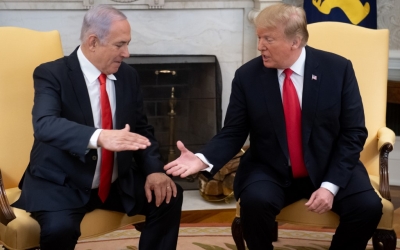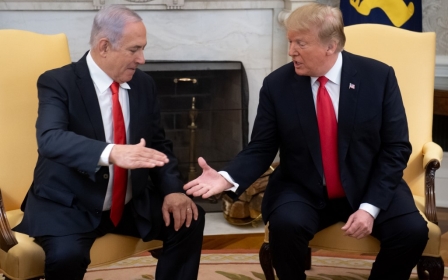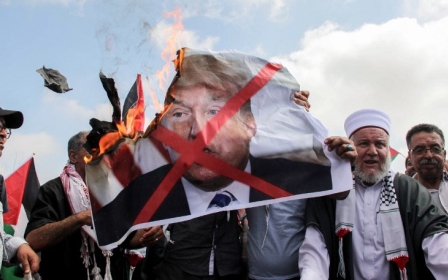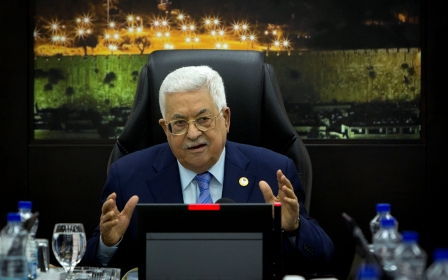Trump Mideast peace plan's economic component to be revealed in June in Bahrain
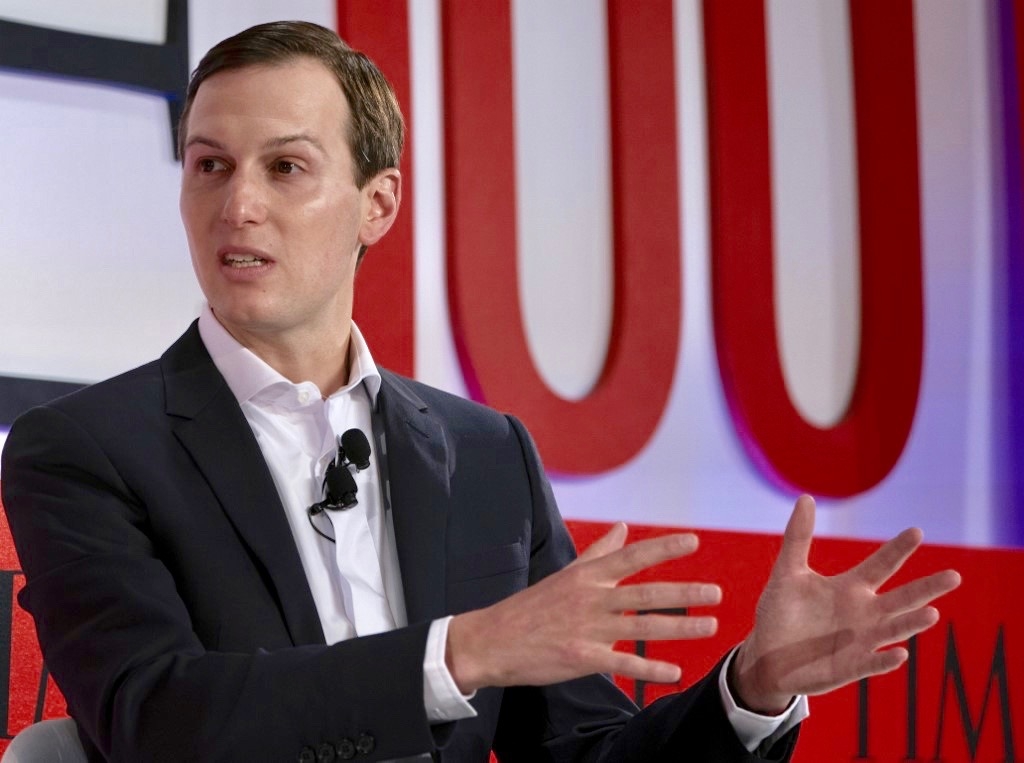
The Palestinians will not attend a US-led conference in Bahrain next month that the Trump administration has cast as a preliminary roll-out of its plan for them to make peace with Israel, a Palestinian cabinet minister said on Monday.
The White House had said in a statement on Sunday that it planned to to release the economic portion of its Israel-Palestine peace plan in late June in Manama.
The economic part of the plan, which will focus on ways to promote the Palestinian economy, was being made public before the political component, which is still under discussion, Israeli newspaper Haaretz reported.
Palestinian Authority (PA) Prime Minister Mohammad Shtayyeh said on Monday that the Palestinian leadership had not been consulted on the issue.
"The cabinet wasn't consulted about the reported workshop, neither over the content, nor the outcome nor timing," Shtayyeh told reporters.
New MEE newsletter: Jerusalem Dispatch
Sign up to get the latest insights and analysis on Israel-Palestine, alongside Turkey Unpacked and other MEE newsletters
After the cabinet met, Ahhmed Majdalani, the social development minister and a member of the executive committee of the umbrella Palestine Liberation Organisation, said: "There will be no Palestinian particaption in the Manama workshop.
"Any Palestinian who would take part would be nothing but a collaborator for the Americans and Israel."
Wasel Abu Youssef, a PLO senior official, also said: "Our position is clear: We will neither participate in the economic segment nor in the political segment of this deal."
'Doomed to fail'
Trump has touted the forthcoming plan as the "deal of the century,” but Palestinian officials have rebuked the US effort, which they believe will be heavily biased in favour of Israel.
US officials have predicted the 25-26 June meeting will include representatives and business executives from Europe, the Middle East and Asia, as well as some finance ministers.
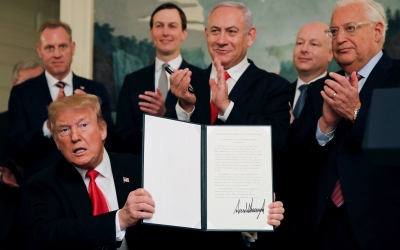
Shtayyeh reiterated Palestinians' core demands for a two-state peace deal with Israel, which include gaining full control of the occupied West Bank and Hamas-governed Gaza, as well as East Jerusalem.
PLO Secretary-General Saeb Erekat also stated on Monday that the PLO was "not consulted by any party on the announced meeting to take place in Manana, Bahrain".
"Attempts at promoting an economic normalization of the Israeli occupation of Palestine will be rejected," Erekat said in a statement.
"This is not about improving living conditions under occupation but about reaching Palestine’s full potential by ending the Israeli occupation.
"All efforts to make the oppressor and the oppressed coexist are doomed to fail."
'We do not submit to blackmail'
The Trump administration has said its still-secret peace plan would require compromise by both sides.
The PA has had no official contacts with the Trump administration since it moved the US embassy to Israel to Jerusalem last year.
Since being shunned by the Palestinian leadership, it has cut back on US aid for them, contributing to economic hardship in the West Bank and Gaza.
"The financial crisis the Palestinian Authority is living through today is a result of the financial war that is being launched against us in order to win political concessions," Shtayyeh told the cabinet.
"We do not submit to blackmail and we don't trade our political rights for money."
According to CNN, the economic plan will have four major components: infrastructure, industry, empowering and investing in people, and governance reforms "to make the area as investible as possible".
The Manama conference, entitled “Peace to Prosperity,” is billed as an international economic "workshop" that will bring together government and business leaders to help jump-start the economic portion of the broader US peace initiative.
The plan is also expected to include proposals for resolving thorny political issues at the heart of the decades-old Israeli-Palestinian conflict, the Reuters said news agency said - as Israel has said it might declare sovereignty over its settlements in the occupied West Bank, in violation of international law.
'Deal of the century'
Trump's Middle East team, led by his son-in-law Jared Kushner and regional envoy Jason Greenblatt, seems to have focused its "deal of the century" efforts on the potential economic benefits, despite scepticism that they can succeed where decades of US-backed efforts have failed.
“This will give hopefully the people in the region the potential to see what the economic opportunities could be if we can work out political issues that have held back the region for a long, long time," a senior Trump administration official told Haaretz.
The official said the plan includes significant investments in the economy of Gaza, which would require a “stable” ceasefire agreement to remain in place.
“There’s a tremendous amount of opportunity, the world is willing to step up and work on this,” the official said.
“But that only happens if we can resolve some of the political issues.
"The two things go hand in hand. There is a real future that can be very exciting, but we have to work on these hard issues.”
The Trump administration has sought to enlist support from Arab governments. The plan is likely to call for billions of dollars in financial backing for Palestinians, mostly from oil-rich Gulf states, according to people informed about the discussions.
Saudi Arabia has assured Arab allies it would not endorse any US plan that fails to meet key Palestinian concerns.
'New and different ways'
Few details of the plan have previously been made public, but it has been widely reported that its political component will not include an independent Palestinian state, Haaretz said.
Kushner hinted last month that it may include limited autonomy for Palestinians.
He said past negotiations over a two-state solution had failed and that "new and different ways to reach peace must be tried".
A senior US diplomat working on the deal told Middle East Eye earlier this month that the Israeli military would retain control over illegal settlements, the Jordan Valley and borders for five years as final status negotiations continue.
The plan, as described by the official, would cement the status quo between Israelis and Palestinians, with the only concession asked of the Israelis to be the freezing of settlement building in the heart of the occupied West Bank during the initial five-year period.
According to the plan, Gaza would be under the control of the Palestinian Authority and Hamas would be expected to hand its weapons over to the PA, which would continue to cooperate with Israel on security.
'Israeli plan, American hands'
It was not clear what would happen at the end of the five-year period, or what the consequences would be if Hamas refused to give up its weapons.
The Palestinians have pre-emptively rejected any proposal by the Trump administration amid concerns it will fall short of their hopes for an independent state.
Shtayyeh earlier this month dismissed the deal as an “Israeli plan written by American hands” that would give Israel “a free hand to annex most of the West Bank under the title of security”.
The Palestinian Authority's demand for a two-state solution is supported by the UN and almost all of its 193 member-states.
However, some pro-Palestine advocates have argued that a two-state solution has long become impossible, arguing that a one-state solution with equal right for its Palestinian and Israeli citizens is the only way forward.
Middle East Eye delivers independent and unrivalled coverage and analysis of the Middle East, North Africa and beyond. To learn more about republishing this content and the associated fees, please fill out this form. More about MEE can be found here.


